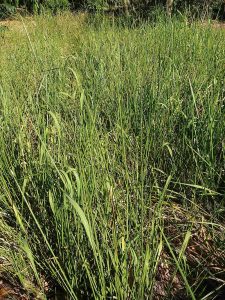Session title: Invasive Species and Forest Ecosystems under Changing Climate: Ecological, Economical and Social Impacts
Moderators:
Daizy R. Batish, Deputy Coordinator IUFRO Division 8.02.04, Panjab University, Chandigarh, India
Shibu Jose, Coordinator IUFRO Division 8.02.04, University of Missouri, USA
Monday, 24 October 2016, 16:00-18:00 (305)
Find more information on the IUFRO Working Party 8.02.04 at: http://www.iufro.org/science/divisions/division-8/80000/80200/80204/
This session took a look at alien species, specifically invasive insects and plants, and their impact on the invaded ecosystems. It particularly addressed the question of how changes within ecosystems associated with climate change affect alien species. Furthermore, presentations shed light on how invasive species can impact the livelihood of people in a social, economic and ecologic level.

Invasive species Cogongrass. Photo: Mark Marathon. CC BY-SA 3.0
While alien species can be found in most ecosystems, some systems like islands and biodiversity hotspots appear to be especially susceptible. Comparative research on Plant Functional Traits (PFTs) can help identify reasons for the invasive nature of some alien species.
Allelopathy can often be observed, as in the case of Cogongrass (Imperatacylindrica (L.) Beauv.). While most native species will react with reduced productivity to this, there are examples of opposite development with native plants thriving under the presence of an allelopathic invader.
A changing climate can further enable invasive species to enlarge the area they occur in, and profit from a weakened native vegetation.
Suppression of native plants can be a serious threat to the livelihood of people whenever crop, medical or other economically important plants are concerned. Thus, the involvement of local communities along with information on PFTs and allelopathy are some key factors for the development of successful control methods.
Presentations in this session:
Comparison of insect invasions in North America, Japan and their Islands(Andrew Liebhold, USA)
Distribution and impact of alien shrub species in forest of Lithuania under changing climate (Vitas Marozas, Lithuania)
Invasive Alien Plants in the Forests of India with special reference to the Woody Perennials (DaizyBatish, India)
Plant invasion in Indian Northwestern Himalayan Region (Vikrant Jaryan, India)
Plant functional traits provide advantage to alien invasive tree Broussonetiapapyrifera over the non-invasive tree Morus alba (Harminder Pal Singh, India)
Imperatacylindrica invasion of the longleaf pine (Pinuspalustris) forests of the U.S Southeast: Impacts on resource availability, understory plant diversity and ecosystem productivity (Shibu Jose, USA)
Additional Information:
IUFRO Spotlight #40 – Biological Invasions: An Undesired Effect of Globalization, http://www.iufro.org/publications/iufro-spotlights/article/2016/10/06/iufro-spotlight-40-biological-invasions-an-undesired-effect-of-globalization/

Leave a Reply